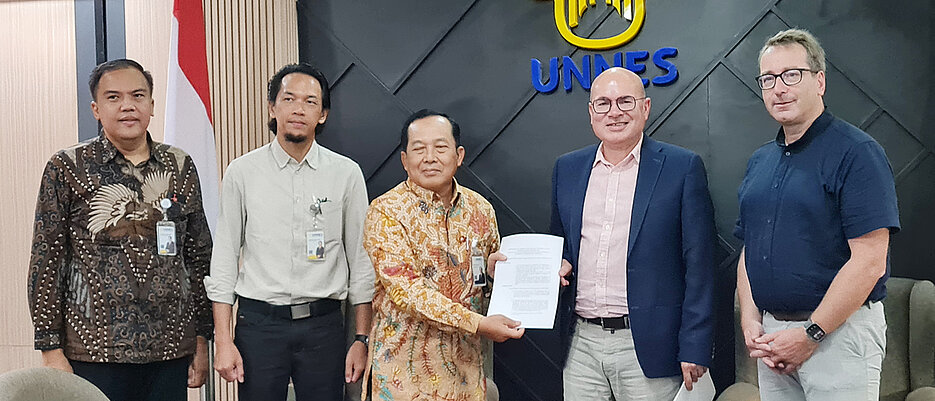The University of Würzburg is further expanding its international cooperation in teacher training. To this end, a delegation from the Professional School of Education has now been on a trip to Indonesia.

According to the Federal Statistical Office, 42.2 per cent of pupils at general and vocational schools in Germany had a migrant background in 2024. Of the approximately 11.4 million pupils, 1.9 million had a foreign passport. This corresponds to a share of 16 per cent.
There is no question that the topic of diversity is playing an increasingly important role in everyday school life - and not just in terms of different origins. It is therefore only good if prospective teachers are sensitised to this topic at an early stage. The "Global Teacher Education" (GoTEd) project, which is funded by the German Academic Exchange Service (DAAD), offers an opportunity to do this. Among other things, it supports student teachers in acquiring intercultural, linguistic and subject-specific skills through study and internship stays at partner universities abroad.
Global Teacher Education with a plus
The University of Würzburg is now expanding its existing programme in this area in two ways: "Global Teacher Education" recently became "Global Teacher Education plus" (GoTEd+). The programme now also integrates the didactics of English and mathematics and gives these subjects an even more global focus.
In addition, representatives from JMU travelled to Indonesia at the end of July. On the island of Java, they laid the first foundations for a new, long-term partnership with the Universitas Negeri Semarang (UNNES). Professor Hans-Stefan Siller, holder of the Chair of Mathematics V - Didactics of Mathematics, and Dr Matthias Erhardt, programme manager for GoTEd+ at the Professional School of Education (PSE), travelled there for this purpose. Siller has been cooperating with the UNNES mathematics didactics department for some time; Prof. Siller and Prof. Cahyono are working together on research projects on digitalisation and mathematical modelling.
An island nation of superlatives
Indonesia is a country of superlatives: located between the Indian and Pacific Oceans, it is the world's largest island state with more than 17,000 islands. With over 280 million inhabitants, it is the country with the fourth largest population in the world; it is also the most populous Muslim country. Matthias Erhardt was able to see for himself that other religions also have a place in the schools. "Of course, the mosque is in the immediate neighbourhood," he says. Nevertheless, there are also prayer rooms for Christian pupils at the school.
Student teachers in Würzburg can gain insights like these if they take part in the GoTEd+ programme. "It's a great benefit for teachers to leave their comfort zone and immerse themselves in a non-European culture," says Matthias Erhardt. Experiencing how schools in other parts of the world deal with the topic of "diversity" and seeing how schools in emerging countries achieve success even with simple means can be enormously valuable for their future careers.
Academic dialogue at eye level
The Würzburg delegation gained many positive impressions during their visit to UNNES. Right at the start of the meetings, they were welcomed by Vice-Rector Heri Yanto, who expressly welcomed the planned exchange. To confirm this, he initiated the signing of a Memorandum of Understanding (MoU) between Universitas Negeri Semarang and the University of Würzburg, which has since been officially signed by both sides. This was followed by meetings with representatives from the university, faculties and the Indonesian Ministry of Science and visits to local partner schools.
Dr Girindra Putri Dewa Saraswati, who works in both the International Office and the Department of English Studies at UNNES, showed great commitment to the cooperation. In future, she will facilitate access to school internships for Würzburg student teachers in Indonesia - an important building block for international teacher training.
In mathematics didactics, there was an intensive exchange with Professor Adi Cahyono, who has been working with Professor Siller for many years. Joint research projects are to be further intensified in the future. Another highlight was the meeting organised by Prof. Cahyono with Berry Juliandi, Director of the Indonesian Ministry of Science in Jakarta. In a constructive discussion, possibilities for supporting Indonesian students at JMU were explored - for example through special scholarships or future double-degree programmes.
Conclusion: A successful start with great prospects
"The trip was a success in every respect - professionally, organisationally and interculturally," Hans-Stefan Siller and Matthias Erhardt agree. The new partnership with UNNES opens up another international window for the GoTEd+ project. "JMU is thus sending out a strong signal in favour of future-oriented teacher training and international cooperation," say the two.






